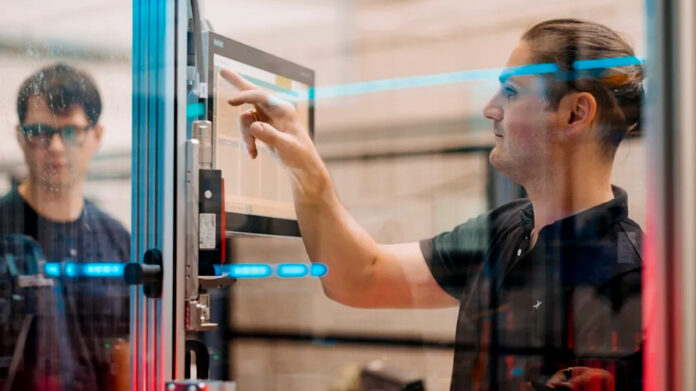Siemens has said its industrial ‘co-pilot’ tool, billed as the first and only generative AI (gen AI) assistant on the market that writes code for automation engineering, is to be offered as an on-premises hardware-software bundle. It has also said it will add “multimodality and agent concepts” into the mix. ThyssenKrupp Automation Engineering, part of German industrial engineering and steel production conglomerate ThyssenKrupp (stylised thyssenkrupp), has adopted the product, called Industrial Copilot, across its global operations.
Making gen AI work for Industry 4.0, so it is trained on relevant enterprise data, and maintained with high security and performance, holds “huge potential” for industrial enterprises to overcome competitive pressures and a lack of skilled labour, and to also drive greater efficiency and productivity. It quoted analyst house Gartner, that 75 percent of developers will use gen AI to assist with code creation by 2028, compared to less than 10 percent in early 2023. Industrial Copilot uses the Azure OpenAI Service of the Microsoft Cloud as its GPT model for natural language processing. Industrial Copilot was “instrumental” in winning ThyssenKrupp as a customer, said Siemens.
ThyssenKrupp Automation Engineering, which builds industrial machines and industrial plants, has deployed the Siemens assistant (Industrial Copilot for Engineering) for battery quality inspections on electric cars. Its engineers use the tool to develop structured control language (SCL) code faster for programmable logic controllers (PLCs), and to integrate the code into so-called TIA Portal (‘totally integrated automation portal’) projects to generate a machine visualisation in Siemens’ WinCC Unified integration platform. Siemens’ ‘TIA Essential’ tool for Industrial Copilot has been available on the Xcelerator marketplace since July.
“This allows engineering teams to reduce repetitive and monotonous tasks like automating data management and sensor configuration. They can work more efficiently, optimise processes, and drive innovation,” said Siemens. ThyssenKrupp Automation Engineering plans to use it at “global locations” from 2025 onwards, said a press statement. Rolf-Günther Nieberding, chief executive at ThyssenKrupp Automation Engineering, said: “Rolling out the Siemens Industrial Copilot across our machines will help us – and therefore our customers – to implement demanding projects in a much shorter time.”
Meanwhile, Siemens has implemented an all-edge version of Industrial Copilot, called Industrial Copilot for Operations, across its soldering machines at its electronics factory in Erlangen, Germany – to help operators and engineers understand error codes by translating machine messages into natural language. “It suggests solutions based on the machine’s details and history by combing through different documents, manuals, and spare part lists. Machine downtime can be significantly reduced, production bottlenecks can be resolved faster, and shift handovers will work more efficiently,” said Siemens. The on-prem version offers “full data sovereignty and security”, it said.
Siemens said: “This configuration doesn’t require an internet connection and stores data on local hardware devices. It helps ensure data security by processing all data right on the shopfloor and keeping customers’ data stored and available when and where it’s needed.” It will be offered as an on-prem hardware-and-software bundle with the Simatic Industrial PC (IPC 1047E). The software stack running on IPCs is powered by Nvidia’s NIM microservices, part of its AI Enterprise platform – which “lets automation and maintenance engineers ask real-time queries about operational and document data to facilitate rapid decision-making and reduce machine downtime”.
Both cloud-connected engineering and all-edge operations versions of the Industrial Copilot product will have multimodal capabilities to analyse and interpret images and drive more productivity with agent-based automation for a variety of tasks, said Siemens. Highly complex automation projects will be partially automated using agent concepts. It stated: “Agent concepts go beyond simple question-and-answer interactions, automating processes by breaking down large, complex tasks into subtasks. All relevant information is then collected from a number of sources, including ECAD information, in order to understand the user goal.”
Rainer Brehm, chief executive for factory automation at Siemens, commented: “We are turning generative AI into industrial-grade solutions that can be deployed without specialised AI expertise. Siemens Industrial Copilot… is a supercharger for industrial automation and will accelerate our customer’s journey toward greater innovation, productivity, and competitiveness.”

